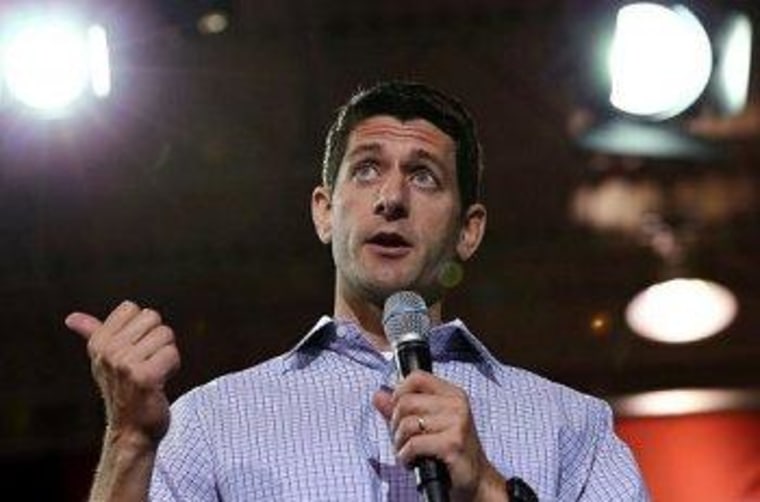When campaign observers ponder whether various VP possibilities will be chosen for their party's ticket, we tend to consider their natural constituencies. One potential running-mate might help with women voters; maybe another would help in the South; another still might help with Latinos; etc.
Paul Ryan doesn't help with any obvious demographic except one: political pundits. Commentators tend to love the right-wing congressman, routinely praising him for being "honest," "serious," and "courageous."
I assumed I wouldn't have to wait too long for a good example of this, and sure enough, on Saturday morning, William Saletan explained why he "loves" Ryan.
Ryan is a real fiscal conservative. He isn't just another Tea-Party ideologue spouting dogma about less government and the magic of free enterprise. He has actually crunched the numbers and laid out long-term budget proposals.
I realize I'm tilting at windmills here. The political/media establishment has decided, practically by edict, that Paul Ryan is a credible wonk whose work must be respected. Proof to the contrary doesn't matter; this characterization is now accepted fact. Why? Because the establishment says it is thus, so stop asking questions.
I don't mean to pick on Saletan -- he's hardly the only one -- but it's important to understand how deeply mistaken he is. Indeed, it's not just voters who need to appreciate the facts; it's media professionals whom voters rely on who need to brush up on the relevant details.
Paul Ryan is not a fiscal conservative. He voted for Bush's tax cuts and didn't feel the need to pay for them. Then he voted for Bush's extremely expensive Medicare expansion, and didn't feel the need to pay for this, either. He also voted for Bush's wars, and had no qualms whatsoever about adding the costs the national credit card, letting future generations pay for our national security goals. To top things off, Ryan also voted to bail out Wall Street, and once more decided the costs should just be added to the debt.
This is not the record of "a real fiscal conservative."
"But wait, Steve," Ryan's defenders tell me, "that only looks at the bulk of Ryan's career in public office. Let's instead look at his more recent record."
Fine. Ryan was a member of the Simpson-Bowles commission, but rejected their debt-reduction plan. He also reviewed President Obama's $4 trillion debt-reduction plan last year, and rejected it, too.
"You're not getting, it, Steve," Ryan's defenders argue. "Look past his congressional voting record and his opposition to debt-reduction plans, and then you'll see what a fiscal conservative he is."
Fine, let's do that, too.
It's true that Ryan crafted a budget plan that brutally cuts investments in domestic priorities like education, health care, and programs that benefit struggling families. Isn't this evidence of fiscal conservatism? Doesn't that prove Ryan has the "courage" to make "tough calls"?
Actually, no. For one thing, there's nothing "courageous" about redistributing wealth from the bottom up, asking those without to suffer more. For another, Ryan's budget redirects those savings into tax cuts, not debt reduction, which is pretty much the opposite of "fiscal conservatism."
But at least Ryan's plan makes gets the nation's finances under control, right? Wrong.
Rep. Paul Ryan made absolutely clear that he is not now and never was interested in deficit reduction. After a couple of years of being lauded by deficit hawks as the man prepared to make hard choices, he proposed a budget that would not end deficits until 2040 but would cut taxes by $4.6 trillion over a decade while also extending all of the Bush tax cuts, adding an additional $5.4 trillion to the deficit. Ryan would increase military expenditures and then eviscerate the rest of the federal government.Oh yes, Ryan claims he'd make up for the losses from his new tax cuts with "tax reform" but offered not a single detail. A "plan" with a hole this big is not a plan at all.
I can't explain why so many in media choose not to believe these facts. I really wish I knew why otherwise-sensible people put aside their critical thinking skills and choose not to read Ryan's actual work before praising it.
In Saletan's case, his own Slate colleague, Jacob Weisberg, made a similar mistake last year, but wisely backpedaled soon after: "I reacted too quickly and didn't sort out just how laughable Ryan's long-term spending projections were. His plan projects an absurd future, according to the Congressional Budget Office, in which all discretionary spending, now around 12 percent of GDP, shrinks to 3 percent of GDP by 2050. Defense spending alone was 4.7 percent of GDP in 2009. With numbers like that, Ryan is more an anarchist-libertarian than honest conservative."
And yet, media professionals continue to fall for the con. There's just no reason for this. It's simply irresponsible. As Paul Krugman explained, "What [Saletan's] doing -- and what the whole Beltway media crowd has done -- is to slot Ryan into a role someone is supposed to be playing in their political play, that of the thoughtful, serious conservative wonk. In reality, Ryan is nothing like that; he's a hard-core conservative, with a voting record as far right as Michelle Bachman’s, who has shown no competence at all on the numbers thing. What Ryan is good at is exploiting the willful gullibility of the Beltway media, using a soft-focus style to play into their desire to have a conservative wonk they can say nice things about. And apparently the trick still works."
Michael Grunwald wrote a terrific item last year: "Profiles in Cowardice: How the Beltway Punditocracy Gets Paul Ryan's Plan Totally Wrong." It pains me to see how little has changed since.
